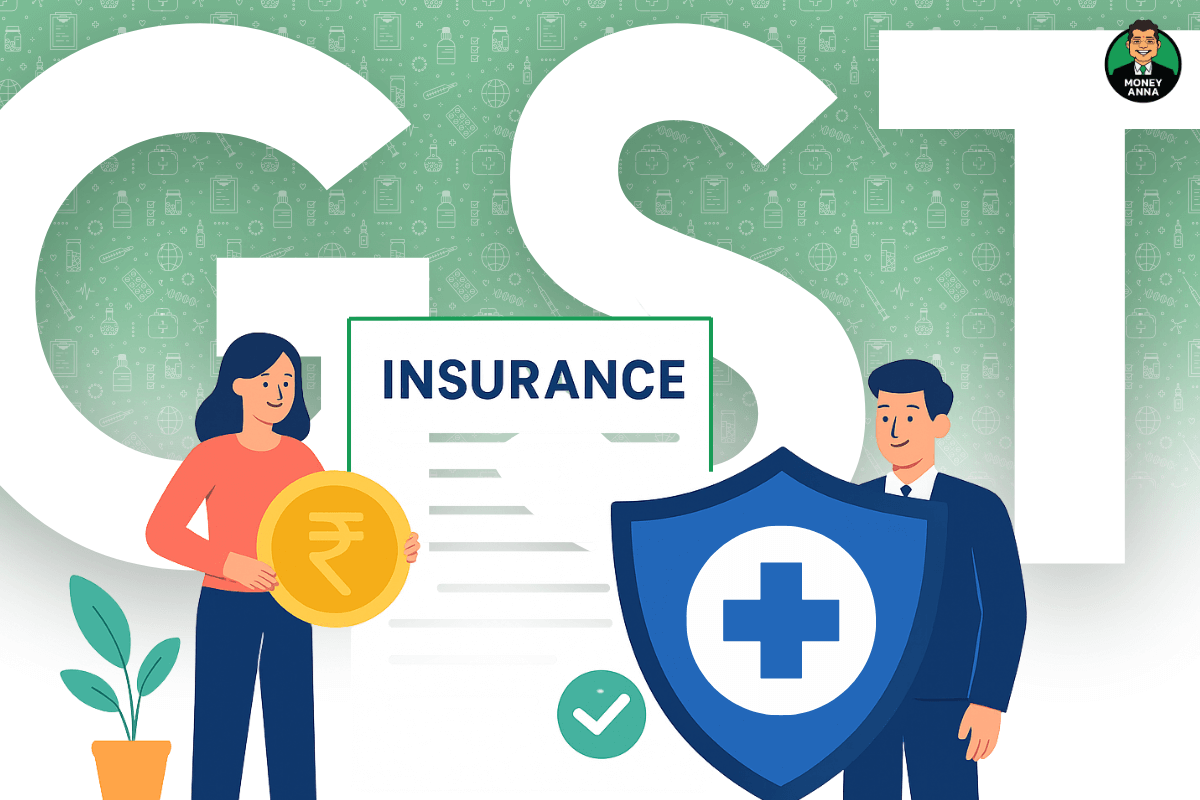What’s in the blog?
This blog breaks down the recent GST Council decision to remove 18% GST on individual life and health insurance premiums, effective September 22, 2025. You’ll learn how this change impacts your premiums, what savings to expect, and the smart steps you should take as a policyholder to make the most of it.
Table of Contents
As an insurance expert, one of the most common discussions I have with my clients revolves around insurance premiums. People understand the value of insurance, but the premium gives a pinch, especially due to the 18% GST. So, the news regarding the waiver of GST on insurance premiums gave me butterflies in my stomach.
I am excited to share with my clients and our readers that insurance premiums are now GST-free!
On September 4, 2025, the GST Council, chaired by Finance Minister Nirmala Sitharaman, announced that individual life and health insurance premiums will now be GST-free. This takes effect from September 22, 2025.
You might already have read the news. In this blog, I’m explaining what this announcement practically means.
Why This News Matters?
Earlier, if your annual premium was ₹25,000, you didn’t just pay ₹25,000. You paid ₹29,500 (because of 18% GST).
Now, you’ll pay only ₹25,000. That’s a direct saving of ₹4,500. Every year when your insurance premium increased, you had to pay 18% GST on that increased amount.
Apart from this simple, straightforward benefit, here’s what this news means for you.
- Immediate savings – This no-GST rule will be officially executed from 22nd September. So, your premiums are going to feel lighter straightaway.
- Simpler calculations – As there’s no GST add-on, there are no more confusing calculations. You’ll just have one clear figure to pay.
- Cheaper even if the premium goes up – Since insurers lose tax credit on expenses, some may now raise the base premium by 1-4%. But you’ll be saving money even after that. For example, even if your premium of 50,000 is raised to 52,000 by the insurer, you’ll be paying just that rather than 59,000 (i.e. 50,000+ 18% GST).
- Added benefits due to increased competition – Now, more and more insurers may cut premiums or add perks to attract more customers after this announcement. This healthy competition is ultimately going to benefit you as the end consumer.
- Long-term advantage – You should know that this no-GST rule is not just for your short-term benefits. This is surely going to create a domino effect in the industry in favour of the customers. Your premiums will remain affordable for years to come.
Why Did the Government Do This?
At this point, you might wonder why the government did this. Doing away with this GST definitely means a direct reduction in government revenue. But, if you see the bigger picture, this is a very well-thought-out move. The purpose behind this is much bigger than just savings for the people already insured.
This decision is more about:
- Making protection more affordable for individuals and families.
- Encouraging first-time buyers (especially young people) to take out insurance early.
- Supporting financial inclusion by reducing cost barriers.
India’s insurance penetration (how many people actually buy insurance) is still low compared to global standards. Removing GST is a step towards changing that.
What to Keep in Mind?
Though the news update seems quite straightforward, the implications might not be so straightforward. Here are a few things that you should keep in mind:
- The GST exemption applies only to individual life and health insurance, not to group insurance or your ULIP (unit-linked insurance plans that mix investment + insurance) plans.
- You may not straightaway save the full 18% on your premium. It will depend on how much your insurer passes on the benefit.
- You won’t be getting any refunds on past payments of this year’s policy. As the rule doesn’t apply retrospectively, GST already paid before Sept 22 stays with the tax department.
- You won’t be able to delay your renewals to get extra benefits. If your premium payment is due before 22nd September, you should not delay renewals to get the benefits. Policies renewed in the grace period won’t get the benefit, and you risk a lapse.
- Expect plan changes. Insurers may reprice or repackage plans with IRDAI approval, so watch for updates. Do not forget to talk to your service provider to understand any updates to your plan.
My Take
This GST exemption is a positive step for every policyholder. It puts money back in your pocket, simplifies premiums, and encourages more people to secure themselves with insurance.
This is the time to review, compare and grab the best value. Because at the end of the day, insurance isn’t just about policies and premiums; it’s about protecting your tomorrow.
Frequently asked questions (FAQ)
If your policy is active and your next premium due date falls on or after September 22, 2025, you’ll automatically pay GST-free premiums. You don’t need to buy a fresh policy.
The GST Council announcement specifically mentioned “individual life and health insurance.” Whether riders will be exempt depends on how insurers categorize them — IRDAI is expected to issue clarifications soon.
Tax rules can change, but historically, when exemptions are given in essential sectors like healthcare or protection products, they tend to stay. Any rollback would likely need a strong justification.
With GST out of the way, premiums will look cleaner and simpler. But don’t just chase the lowest number — look at claim settlement ratios, customer service, hospital networks (for health), and extra benefits before deciding.
You should now review your current policies, ask your insurer about revised premiums, compare across companies, and avoid lapses. If you’ve been postponing insurance, now is a good time to buy.




